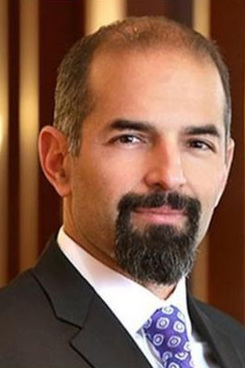Tort reformers have targeted the role of serial plaintiffs, with some calling it a factor in frivolous litigation. With the role of serial litigants a hot topic in the law, litigators would be well-served to understand just what goes on in the mind of a frequent filer.
Plaintiffs who file multiple suits are a fixture in Americans with Disabilities Act suits over accessibility of retail premises and websites, and the issue also arises in other types of cases, including those brought under the Telephone Consumer Protection Act.
But why do serial plaintiffs do what they do?
‘Didn’t Take Too Much Effort’
When C. Robert Luthman is defending premises liability and automobile accident cases in New Jersey courts, he sees plaintiffs who are bringing their sixth, seventh or eighth personal injury case.
Luthman, the president of the New Jersey Defense Association, said such plaintiffs typically have learned that filing lawsuits is a way to earn some extra money.
“I think it’s just a situation where some people say, ‘Well, I’ve done this before. I was able to kind of profit off of it a little bit, [and it] didn’t take too much effort,’” Luthman said.
The U.S. Chamber of Commerce maintains that serial litigants abuse the TCPA by working to expand the legal boundaries of the law’s provisions beyond their intended scope, which has resulted in “a thriving market of questionable lawsuits.”
The TCPA, signed into law in 1991, governs solicitations by voice call, fax and text message and requires telemarketers to refrain from calling phone numbers on the National Do Not Call Registry.
Meet Omar Khouri
Since 2020, Omar Khouri has amassed more than $120,000 in claims against telemarketers who call him. In 2022, he used part of the proceeds to buy a bar in his hometown of Winston-Salem, North Carolina, which he named “The Wrong Number.”
The menu features drinks called “Debt Relief,” “Student Loan” and “Car Warranty.”
But Khouri insists he’s not a “professional plaintiff,” unlike others who sue telemarketing companies. He makes that distinction because he has filed about 20 to 30 cases, while others have brought hundreds, and because he still has his day job, running an information technology company. In addition, he avoids tactics that will bring in more telemarketing calls, such as signing up on websites as a prospective customer and having multiple phones.
 Tim Carwinski of Reed Smith. Courtesy photo
Tim Carwinski of Reed Smith. Courtesy photo“Don’t lump me in with them, because that’s not what I’m doing,” Khouri said. “I don’t agree with doing that because it’s just dishonest. These people may never get a single phone call if they don’t bait the telemarketers into doing it.”
With no legal training, Khouri first got the idea for bringing claims against telemarketers during the height of the pandemic, when revenue from his IT business dropped and he found he had time on his hands.
In many cases Khouri doesn’t have to file a complaint in court, but merely sends a demand letter stating what happened and seeking payment—at first he sought $10,000, but now sometimes he gets more.
He was familiar with the concept of a demand letter from his IT business, where he sometimes had to write to clients who failed to pay him.
Khouri brings claims under North Carolina’s Telephone Solicitation Act, which he says is similar to the TCPA but more remunerative.
While the TCPA provides $500 in statutory damages per violation, North Carolina’s law provides $500 in damages for the first violation, $1,000 for the second and $5,000 for the third and subsequent violations, Khouri said.
And under the law, “a single phone call can have 10 violations on it. So a single phone call can actually add up to quite a lot,” Khouri said.
Now, when Khouri gets a telemarketing call, he might hang up if it’s during the workday, but he’ll take the call if he’s hanging out watching Netflix. He doesn’t ask a lot of questions because it can scare away the telemarketer. Finding out the name of the company behind the call can be the most difficult part of his endeavor, and sometimes he stays on the line for 45 minutes or an hour before getting that information.
Khouri says people who sell cars know that the longer customers stay in the showroom, the more likely they are to buy a car.
“But it works the other way, too. The salesman or the telemarketer, they’ll spend an hour of their time talking to you. And now they spend all that time and they’re so close to making the sale and you ask them, ‘Hey, what’s the name [of the company]?’ They just want to make that sale because they’ve already spent all that time,” he said.
Khouri thinks the TCPA and related state laws are worthwhile and can provide some benefit to the public.
“If even 5(%) or 10% of us who get these telemarketing calls actually take action, the telemarketers just go away because it becomes too expensive for them to operate,” he said. “I’m doing this because I genuinely want these things to stop.”
Besides buying the bar, Khouri has used the litigation proceeds to help with medical bills for a friend being treated for cancer, and he also uses those funds to buy drinks for “random strangers” in his bar.
“I’m not trying to get rich off suing telemarketers. I have a regular job to deal with. This is just something I found that … I have the patience and temperament for. So why not? I think if I’m winning against telemarketers, then we’re all winning,” he said.
‘Vague Law’
Tim Carwinski of Reed Smith in Chicago said that he often encounters serial litigants in his role as defense counsel in TCPA cases. He thinks serial litigants bring TCPA suits to earn some extra money and because “they really do, many of them, like playing lawyer,” he said.
 Eric J. Troutman of Troutman Amin in Irvine, California. Courtesy photo
Eric J. Troutman of Troutman Amin in Irvine, California. Courtesy photoTo the extent that courts entertain debate about whether frequent-filer status disqualifies a TCPA plaintiff, it’s generally based on allegations that the plaintiff “invented their own harm,” said Eric J. Troutman of Troutman Amin in Irvine, California.
Troutman was on the defense team in a 2016 Western District of Pennsylvania case, Stoops v. Wells Fargo Bank, in which the court dismissed a TCPA suit by a plaintiff who kept almost three dozen cellphones in a shoe box to receive calls from businesses.
“What the court found was that someone who invents their own harm cannot recover under the statute,” Troutman said. “And in that case, the lady had bought 35 cellphones intentionally in order to try to get wrong member calls.”
The Wells Fargo case was frequently cited in other TCPA suits involving serial plaintiffs who were accused of manufacturing their own harms, Troutman said.
But that gave rise to another line of cases holding that merely filing multiple TCPA suits doesn’t mean plaintiffs are inventing their own harm, and more evidence is needed besides multiple suits to show that plaintiffs are manufacturing harm, Troutman said.
Ultimately the bottom line is that manufactured harm is difficult to prove, and in most cases it goes undetected, he said.
But misconduct by certain plaintiffs doesn’t mean the whole law should be scrapped, Troutman said.
“TCPA is a vague law. It is hard for companies to comply with the law when different courts across the country interpret it differently,” he said. “That’s a challenge. But I agree that private enforcement of the TCPA where it is done validly is valuable. It is very valuable. And, truthfully, I support it when it’s done the right way.”
